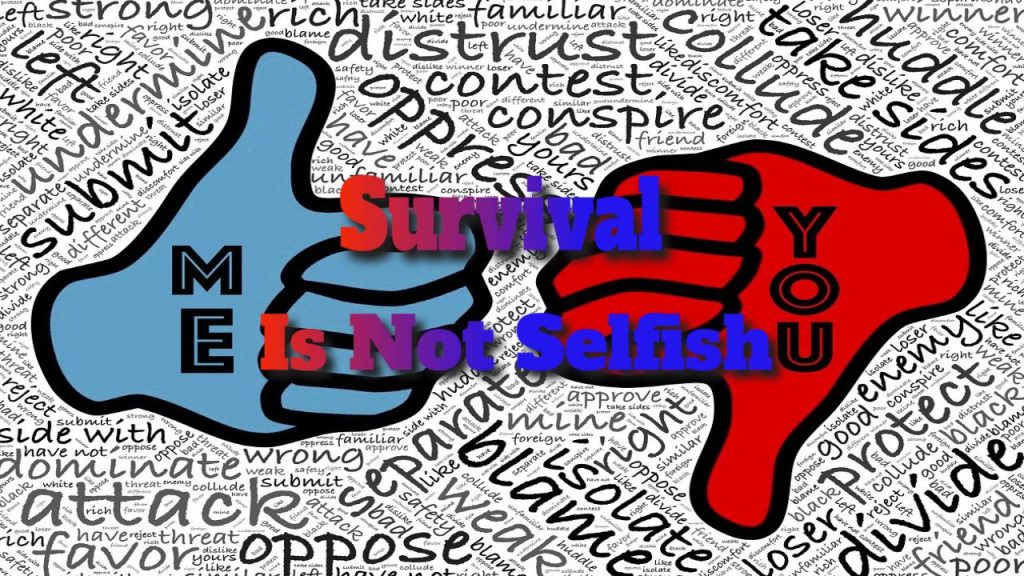Why Survival Is Not Selfish
When you think about it, have you ever wondered why putting one's survival first is not seen to be selfish?
At first glance, this idea could appear to be contradictory; nevertheless, when you go deeper into it, you will find that survival encompasses more than just the act of preserving one's own life. On the contrary, it lays the groundwork for empathy, compassion, and overall well-being, not only for oneself but also for other people.
Now, let's take a look at the reasons why survival is more than just a self-serving activity, as well as how it can be beneficial to the world around you.
The instinctive drive to survive
The innate drive that we all possess kicks in when it comes to the issue of survival, prompting us to do whatever it takes to ensure our safety. This underlying drive for survival is deeply established in us, and it guides our behaviors and decisions when we are in a precarious situation. Our safety must take precedence over anything else because of this.
The drive to survive compels us to seek shelter in adverse weather conditions, to get food and water when resources are in short supply, and to protect ourselves from potentially hazardous situations. The ability to adapt, be resourceful, and persevere in the face of adversity is intrinsically motivated by this instinct.
There is no selfishness in our urge to survive; rather, it is an intrinsic part of our nature that ensures our survival in a world that is both uncertain and dangerous.
Self-Preservation and Personal Responsibility
If you want to continue existing, you have to acknowledge that you are responsible for your health and make self-preservation a top priority. If you find yourself in a precarious situation or emergency, you have to make choices that will protect you and save your life. No one else is capable of doing this for you.
When you admit that your survival is ultimately in your hands, you are acknowledging an acceptance of personal responsibility. To be better prepared for potential dangers, it would be beneficial to take preventative measures, such as accumulating emergency supplies and strategizing.
Along with this, it means making choices that put your health and well-being at the forefront, such as engaging in self-care practices, leading a healthy lifestyle, and seeking support when it is needed. Accepting responsibility for one's own life and well-being is a fundamental component of self-preservation, which is not the same thing as being selfish. Self-preservation is an integral part of survival.
Balancing self-care and altruism
Take a look at the delicate balance that must be maintained in survival situations between caring for oneself and caring for others.
It is essential to take care of oneself in times of crisis to keep your physical and mental health in good condition. Because of this, you will require a substantial amount of food, water, and rest to keep your strength.
Having said that, it is of the utmost importance to acknowledge that trying to survive is not a singular undertaking. Offering assistance to others wherever it is feasible, sharing resources, and working together to increase everyone's chances of survival are all examples of how to demonstrate consideration for other people.
You need to make educated decisions that take into account both your requirements and the requirements of people around you to strike a balance between self-care and compassion. It is possible to negotiate survival circumstances with empathy and collaboration if you can find this balance, which increases the possibility that a favorable solution will occur for everyone involved.
Survival: A Foundation for Empathy and Compassion
To build empathy and compassion, survival is a crucial motive that should be given consideration. When you are constantly fighting for your survival, you come to understand the significance of having empathy and compassion for other people.
When you are in a difficult situation, you realize that you cannot rely just on yourself; you also require the assistance of those who are close to you. This insight helps you develop empathy because it enables you to put yourself in the position of the difficulties and worries that other people are experiencing. Because you realize that you need to help others who are in need, it strengthens your compassion.
The Ripple Effect of Prioritising Wellbeing
If you make your health a priority, you will set off a chain reaction that will be beneficial to those in your immediate environment. You can make a greater contribution to the lives of others when you put your health first. To become more resilient and capable of overcoming the challenges that life throws at you, it is important to take care of yourself on all levels: physically, psychologically, and emotionally.
As a consequence of this, you can offer support and strength to those who are dependent on you. If you make your health and happiness a top priority, you are demonstrating self-love and self-care, and you are also encouraging others to do the same. It is possible to transmit happiness through your connections and social networks by maintaining a positive attitude and energy.
How do external circumstances influence survival instincts?
Several external factors might affect survival instincts. These factors include the environment, societal norms, and cultural beliefs.
These external pressures have the potential to alter your core instincts for survival, which in turn might influence your decisions and actions.
What are some practical strategies to reconcile self-care with altruism in survival situations?
In life-threatening circumstances, it is essential to strike a balance between self-care and giving.
You will be in a better position to assist other people if you take care of yourself.
While taking into account the requirements of the group, give the utmost importance to fundamental necessities such as food, water, and rest.
How does prioritizing one’s well-being benefit others over time?
Putting your health and happiness first has a positive and lasting effect on others around you. By taking care of yourself, you are better able to provide assistance and support to those who are in your immediate vicinity.
Can surviving experiences foster empathy and compassion?
It is beyond a doubt that experiences of survival can be of assistance in the development of empathy and compassion. Having been through adversity yourself, you are more able to empathize with the challenges that others face and are more likely to offer assistance to them.
In a personal sense, conquering challenges may assist you in being more resilient and sensitive to the surrounding environment. When you have triumphed over challenges and become stronger, you may be able to empathize with those who are going through experiences that are comparable to your own. Having this experience together helps to cultivate a more profound understanding as well as a more substantial relationship.
A further benefit of overcoming challenges is that it might broaden your perspective. Along the road, you come across various methods of living and are forced to question your established notions. This broader perspective has the potential to result in more compassion and understanding for individuals who come from a variety of backgrounds.
When confronted with difficult circumstances, it is frequently necessary to seek the aid of other people. Whether it comes from friends and family or strangers, you hold kindness and empathy in high regard. Receiving assistance firsthand might motivate you to help others and make you more sensitive to the plight of those who are in need.
Are there ethical difficulties when prioritizing self-preservation over personal responsibility in survival scenarios?
There is the potential for ethical conundrums to arise in survival situations where factors such as self-preservation and personal responsibility take precedence. However, it is essential to understand that survival is not always a matter of self-interest.
In these kinds of circumstances, it is assumed that one will put their health first.
It is important to remember that you are not being selfish the next time you find yourself prioritizing your survival and well-being over other concerns. It is a natural tendency that enables you to take care of yourself while also making a positive contribution to the environment that you are surrounded by.
You may unleash a wave of empathy and compassion that makes the world a better place for everyone if you strike a balance between protecting yourself and being kind.
The post Why Survival Is Not Selfish appeared first on Survival Avenue.
The Article Why Survival Is Not Selfish was found on https://limitsofstrategy.com



